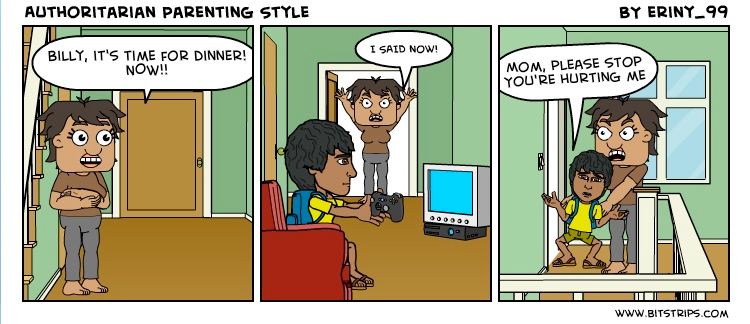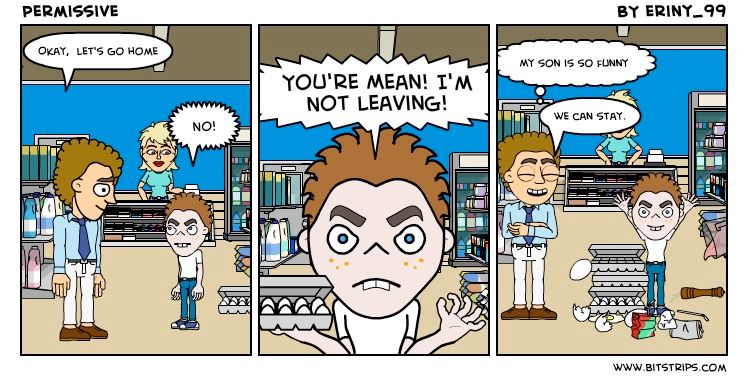Parenting styles and their effects on kids
Parenting styles
1. Authoritarian Parenting - Authoritarian parents believe kids should follow the rules without exception. They also don't allow kids to get involved in problem-solving challenges or obstacles. Instead, they make the rules and enforce the consequences with little regard for a child's opinion. Authoritarian parents are famous for saying, "Because I said so," when a child questions the reasons behind a rule. They are not interested in negotiating and their focus is on obedience. Authoritarian parents may use punishments instead of discipline. So rather than teaching a child how to make better choices, they're often focused on making a child suffer for his mistakes.
Children who grow up with strict authoritarian parents tend to follow rules much of the time
(
2. Authoritative Parenting - authoritative parents establish clear rules. But, they allow for reasonable exceptions to the rules.
Authoritative parents often use logical consequences that teach life lessons. They also use positive discipline to prevent behavior problems and to reinforce good behavior. So they may be more likely to create reward systems and praise good behavior.
Children raised with authoritative discipline tend to be happy and successful. They're also more likely to be good at making decisions and evaluating safety risks on their own. Researchers have found kids who have authoritative parents are most likely to become responsible adults who feel comfortable expressing their opinions.
(
3. Permissive Parenting - Permissive parents are lenient. They often only step in when there's a serious problem.
They don't give out consequences very often. They're quite forgiving and they adopt an attitude of "kids will be kids." When they do use consequences, they often give in if a child begs or promises to be good. Permissive parents usually take on more of a friend role than a parent role. They often encourage their children to talk with them about their problems, but they usually don't put much effort into discouraging poor choices or bad behavior. may not discourage a lot of bad behaviors.
(
4. Uninvolved Parenting - Uninvolved parents basically expect children to raise themselves. They usually don't devote much time or energy into meeting children's basic needs. Uninvolved parents are often neglectful. But sometimes, it's not intentional. A parent with mental health issues or substance abuse problems, for example, may not be able to care for a child's physical or emotional needs on a consistent basis. At other times, uninvolved parents lack knowledge about child development. And sometimes, they're simply overwhelmed with other problems, like work, paying bills, and managing a household.
(
Parenting styles and their effects on kids
There is agreement among a number of authors that the authoritative parenting style, characterized by a combination of a high level of compassion, the setting of a child and heat demand, with a low level of conflict and negativity, most contributes to school success (Taylor et al., 2004).
There is consistent evidence that the authoritative style is associated with the best outcomes in many domains of child development, including psychosocial functioning, school competence, emotional well-being, and behavioral adjustment, while the uninvolved style (low on both warmth and control) correlates with poor adjustment and problem behavior (like drug and alcohol use, school misconduct, delinquency) and is therefore considered a risk factor in child development (Lamborn et al., 1991; Maccoby and Martin, 1983; Steinberg, 1990; Richardson et al., 1993).
Some studies (Kohn 1997; Steinberg 1991) indicate that authoritative parenthood and that autocratic parenting can be less harmful, and can even serve as a protective factor for children Living in poor conditions and a dangerous environment.
There is a significant influence of parental style on the existence of parents' conflicts with adolescents and on the appearance of depressive symptoms in adolescents. The highest level of family-adolescent conflict and depressive symptoms was found in families with uninvolved parents, followed by autocratic parents. .Those families with permissive and authoritative parents, especially the authoritative, have a relatively low level of conflict and depressive symptoms in the adolescent.
Uninvolved parenting is associated with higher levels of delinquency in adolescent boys, and permissive parenting is associated with delinquent behavior of girls.
Conclusion: Try to be authoritative parents, because your children will be successful in all domains of life
Congratulations @top5attractions! You have completed some achievement on Steemit and have been rewarded with new badge(s) :
Click on any badge to view your own Board of Honor on SteemitBoard.
For more information about SteemitBoard, click here
If you no longer want to receive notifications, reply to this comment with the word
STOPGreat post! Hope you'll be writing more about psychology :)